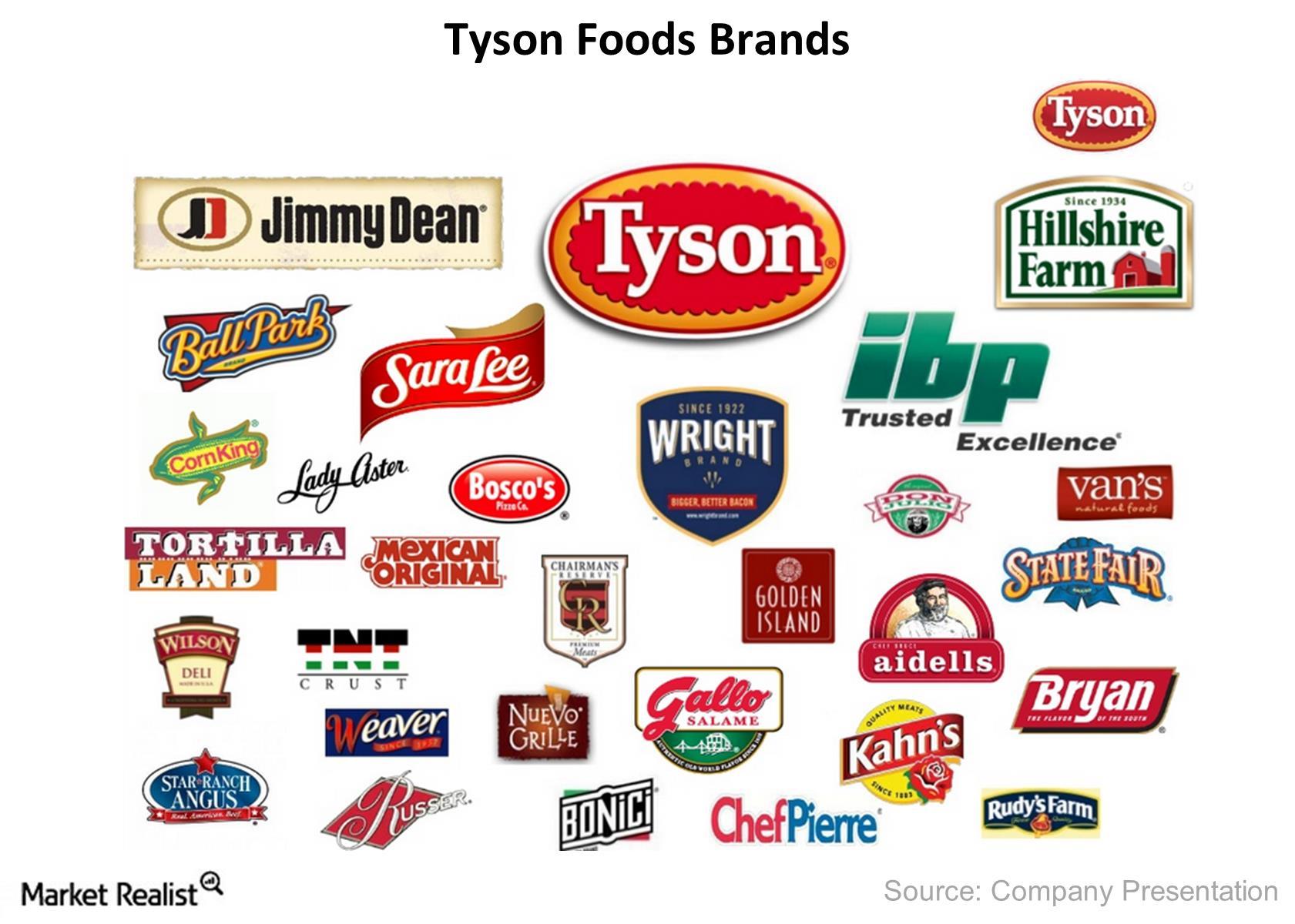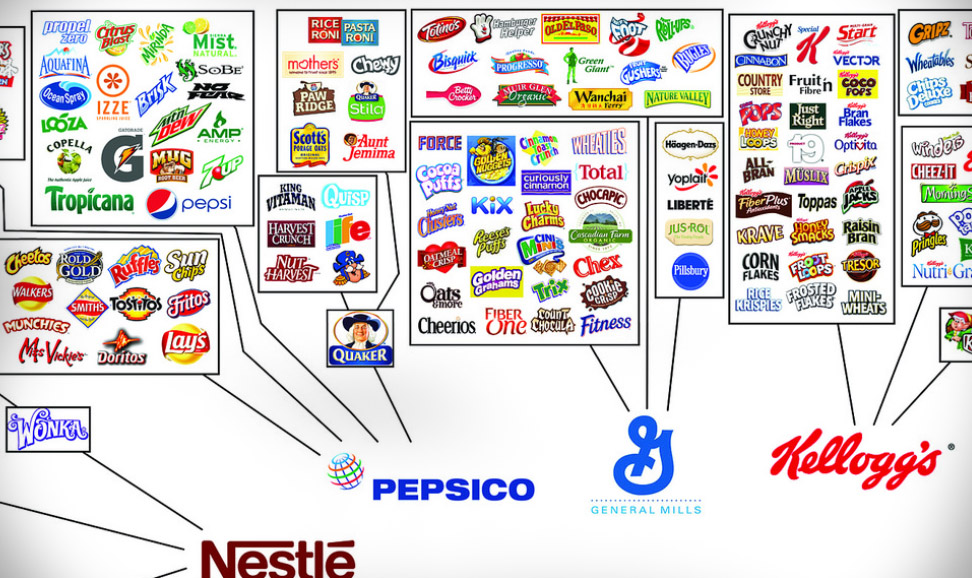Tyson Foods: Expanding Portfolio Of Subsidiaries And Brands
Tyson Foods, Inc. is one of the world's largest food companies, with annual sales of over $40 billion. The company was founded in 1935 by John W. Tyson and is headquartered in Springdale, Arkansas. Tyson Foods owns a number of well-known brands, including Tyson, Jimmy Dean, Hillshire Farm, and Sara Lee.
Tyson Foods is a vertically integrated company, meaning that it controls all aspects of its operations, from raising livestock to processing and packaging food products. The company owns over 100 processing plants and distribution centers around the world. Tyson Foods also has a large network of contract farmers who raise livestock for the company.
Tyson Foods is a major supplier of food products to grocery stores, restaurants, and other foodservice businesses. The company's products are also sold in retail stores under the Tyson, Jimmy Dean, Hillshire Farm, and Sara Lee brands.
| Name | Position | Years |
|---|---|---|
| John W. Tyson | Founder | 1935-1967 |
| Don Tyson | Chairman and CEO | 1967-1995 |
| John H. Tyson | Chairman and CEO | 1995-2006 |
| Donnie Smith | Chairman and CEO | 2006-2018 |
| Noel White | Chairman and CEO | 2018-present |
Tyson Foods is a publicly traded company and its stock is listed on the New York Stock Exchange. The company has a market capitalization of over $20 billion.
Tyson Owns What Companies
Tyson Foods, Inc. is one of the world's largest food companies, with annual sales of over $40 billion. The company was founded in 1935 by John W. Tyson and is headquartered in Springdale, Arkansas.
- Brands
- Products
- Operations
- Financials
- Employees
- Sustainability
Tyson Foods owns a number of well-known brands, including Tyson, Jimmy Dean, Hillshire Farm, and Sara Lee. The company's products include chicken, beef, pork, and prepared foods. Tyson Foods operates over 100 processing plants and distribution centers around the world. The company has a workforce of over 120,000 employees. Tyson Foods is committed to sustainability and has a number of programs in place to reduce its environmental impact.
1. Brands
Tyson Foods owns a number of well-known brands, including Tyson, Jimmy Dean, Hillshire Farm, and Sara Lee. These brands are all leaders in their respective categories and have a strong following among consumers.
- Tyson is the number one brand of chicken in the United States. It is also a major producer of beef, pork, and prepared foods.
- Jimmy Dean is a leading brand of breakfast sausage and other breakfast products.
- Hillshire Farm is a major producer of lunch meats, hot dogs, and other deli meats.
- Sara Lee is a leading brand of baked goods, including bread, cakes, and pies.
Tyson Foods' brands are a major asset to the company. They give Tyson Foods a strong presence in a number of different food categories and help the company to compete with other food giants.
2. Products
Tyson Foods is one of the world's largest food companies, with annual sales of over $40 billion. The company owns a number of well-known brands, including Tyson, Jimmy Dean, Hillshire Farm, and Sara Lee. Tyson Foods' products include chicken, beef, pork, and prepared foods.
- Chicken
Tyson Foods is the number one producer of chicken in the United States. The company's chicken products include fresh, frozen, and cooked chicken. Tyson Foods also produces a variety of chicken-based products, such as chicken nuggets, chicken strips, and chicken wings.
- Beef
Tyson Foods is a major producer of beef. The company's beef products include fresh, frozen, and cooked beef. Tyson Foods also produces a variety of beef-based products, such as ground beef, beef patties, and beef roasts.
- Pork
Tyson Foods is a major producer of pork. The company's pork products include fresh, frozen, and cooked pork. Tyson Foods also produces a variety of pork-based products, such as bacon, sausage, and ham.
- Prepared foods
Tyson Foods produces a variety of prepared foods, including frozen meals, sandwiches, and snacks. The company's prepared foods are sold under a variety of brands, including Tyson, Jimmy Dean, and Hillshire Farm.
Tyson Foods' products are sold to a variety of customers, including grocery stores, restaurants, and other foodservice businesses. The company's products are also sold in retail stores under the Tyson, Jimmy Dean, Hillshire Farm, and Sara Lee brands.
3. Operations
Tyson Foods is a vertically integrated company, meaning that it controls all aspects of its operations, from raising livestock to processing and packaging food products. This gives Tyson Foods a number of advantages over its competitors, including:
- Control over quality: Tyson Foods can ensure the quality of its products by controlling every step of the production process.
- Efficiency: Tyson Foods can streamline its operations and reduce costs by controlling all aspects of its business.
- Flexibility: Tyson Foods can quickly respond to changes in demand by adjusting its production levels.
Tyson Foods' operations are divided into four segments: chicken, beef, pork, and prepared foods. Each segment has its own dedicated team of employees and its own set of processing plants and distribution centers. This allows Tyson Foods to focus on the specific needs of each segment and to produce high-quality products efficiently.
Tyson Foods' operations are essential to the company's success. The company's vertically integrated model gives it a number of advantages over its competitors and allows it to produce high-quality products efficiently.
4. Financials
Tyson Foods is a publicly traded company and its stock is listed on the New York Stock Exchange. The company has a market capitalization of over $20 billion. Tyson Foods' financial performance is important to investors because it provides insights into the company's health and its ability to generate future profits.
Tyson Foods' financial performance is driven by a number of factors, including the prices of livestock, the demand for its products, and the efficiency of its operations. In recent years, Tyson Foods has faced challenges due to the rising cost of livestock and the impact of the COVID-19 pandemic. However, the company has also benefited from strong demand for its products and its focus on cost-cutting.
Tyson Foods' financial performance is important to the company's stakeholders, including its shareholders, employees, and suppliers. The company's financial performance also has a broader impact on the economy, as Tyson Foods is a major employer and a major purchaser of agricultural products.
Overall, Tyson Foods' financial performance is a key indicator of the company's health and its ability to generate future profits. The company's financial performance is driven by a number of factors, including the prices of livestock, the demand for its products, and the efficiency of its operations.
5. Employees
Employees are the backbone of any company, and Tyson Foods is no exception. The company's success is due in large part to the hard work and dedication of its employees. Tyson Foods employs over 120,000 people in a variety of roles, from production workers to sales representatives to executives. These employees work together to ensure that Tyson Foods produces high-quality products that meet the needs of its customers.
Tyson Foods is committed to providing its employees with a safe and supportive work environment. The company offers a variety of benefits to its employees, including health insurance, paid time off, and retirement savings plans. Tyson Foods also invests in training and development programs to help its employees reach their full potential.
The connection between employees and Tyson Foods is a mutually beneficial one. Tyson Foods provides its employees with good jobs and benefits, and in return, the employees help Tyson Foods to achieve its business goals. This relationship is essential to the success of both the company and its employees.
6. Sustainability
Tyson Foods is committed to sustainability and has a number of programs in place to reduce its environmental impact. The company's sustainability initiatives focus on four key areas: animal welfare, environmental stewardship, employee well-being, and community involvement.
- Animal welfare
Tyson Foods is committed to the humane treatment of animals. The company has a number of programs in place to ensure that its animals are raised in a safe and healthy environment. Tyson Foods also works with suppliers to improve animal welfare practices throughout the supply chain.
- Environmental stewardship
Tyson Foods is committed to reducing its environmental impact. The company has a number of programs in place to reduce its water use, energy consumption, and greenhouse gas emissions. Tyson Foods also works with suppliers to improve environmental practices throughout the supply chain.
- Employee well-being
Tyson Foods is committed to the well-being of its employees. The company offers a variety of programs to support its employees' health, safety, and financial security. Tyson Foods also works to create a positive and inclusive work environment.
- Community involvement
Tyson Foods is committed to giving back to the communities where it operates. The company supports a variety of programs that focus on education, hunger relief, and community development. Tyson Foods also works to promote volunteerism among its employees.
Tyson Foods' sustainability initiatives are essential to the company's long-term success. The company's commitment to sustainability helps to ensure that it can continue to operate in a responsible and sustainable manner for years to come.
FAQs on Tyson Foods' Ownership
This section addresses frequently asked questions regarding the companies owned by Tyson Foods, providing a comprehensive overview of the company's portfolio.
Question 1: What are the primary brands owned by Tyson Foods?
Tyson Foods owns an extensive range of well-known brands, including Tyson, Jimmy Dean, Hillshire Farm, and Sara Lee, each holding a strong presence in their respective food categories.
Question 2: Does Tyson Foods solely focus on chicken production?
While Tyson Foods is renowned for its chicken products, the company's portfolio extends beyond poultry. It also holds a significant market share in beef, pork, and prepared food products, catering to diverse consumer needs.
Question 3: How does Tyson Foods ensure the quality of its products?
Tyson Foods maintains strict quality control measures throughout its vertically integrated operations. By overseeing every stage of production, from livestock raising to processing and packaging, the company can consistently deliver high-quality products to its customers.
Question 4: What factors influence Tyson Foods' financial performance?
Tyson Foods' financial performance is influenced by various factors, including livestock prices, consumer demand for its products, and the efficiency of its operations. The company's ability to manage these factors effectively contributes to its overall financial health.
Question 5: How does Tyson Foods contribute to sustainability?
Tyson Foods places great importance on sustainability, implementing initiatives focused on animal welfare, environmental stewardship, employee well-being, and community involvement. These efforts demonstrate the company's commitment to operating responsibly and minimizing its environmental impact.
In conclusion, Tyson Foods' ownership extends across a diverse portfolio of well-established brands, encompassing a wide range of food products. The company's commitment to quality, financial performance, and sustainability further solidifies its position as a leading player in the food industry.
Transition to the next article section: Exploring the operational structure of Tyson Foods...
Conclusion on Tyson Foods' Ownership
Tyson Foods' ownership encompasses a vast portfolio of well-known brands, including Tyson, Jimmy Dean, Hillshire Farm, and Sara Lee, establishing a dominant presence across various food categories. The company's vertically integrated operations ensure strict quality control, enabling the delivery of high-quality products to consumers.
Tyson Foods' financial performance is influenced by factors such as livestock prices, consumer demand, and operational efficiency. The company's commitment to sustainability extends to animal welfare, environmental stewardship, employee well-being, and community involvement, demonstrating its dedication to responsible business practices.
- Fritz American Pickers
- Jason Momoa Johnny Depp
- Jeanne Clarkson
- Who Is Angela Lansbury Married To
- How Old Is Jid

TYSON FOODS, INC. FORM 8K EX99.2 INVESTOR PRESENTATION May 29

The Vast Expanse Of The Tyson Foods Product Portfolio

Only 10 Companies Control Almost Every Large Food And, 40 OFF